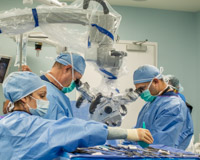If you have a friend or family member who’s contemplating minimally invasive spine surgery, you are likely to have some questions and concerns. You want to support your loved one the best you can, but you may also be worried about all that surgery entails.
To help you with this, we’ve created a checklist of things you can do. Follow these steps—not only to assist your loved one through this process, but to ease your mind as well.
Provide Emotional Support
One of the best things to do for a loved one is also one of the simplest: Listen to them. How are they feeling? Are symptoms interfering with their day-to-day life? What do they hope for an outcome? Do they have particular fears or worries regarding surgery?
Having an emotional outlet can be very cathartic for your loved one, especially if they have been living in pain for an extended time. It can also provide you with great insight into what your loved one has been experiencing. This knowledge will be very useful as you embark together on the path toward recovery.
Educate Yourself
It’s also helpful to have a basic understanding of your loved one’s condition and the type of minimally invasive spine surgery they are considering. Be sure to use reliable sources when doing your research. Check out some of the following websites:
- Spine-health: This website provides a wealth of information regarding common back and neck conditions, treatment options, and overall wellness. If you are a visual person, there are great, short videos as well.
- SpineUniverse: Similarly, this website delivers clear and straightforward information from experts in spine care.
- DISC Sports & Spine Center Blog: We want our patients to be informed. We’ve taken our patients’ most common questions to create “Learn from Our Experts” section, featuring both short articles and longer guides. You can also find our “Patient Stories” section to read about others’ experiences with minimally invasive spine surgery.
Be an Extra Set of Ears (or Hands) at Doctor’s Appointments
Doctor’s appointments, especially when discussing serious matters such as surgery, can sometimes feel overwhelming. A lot of information is shared in a short period of time, and it’s easy to miss or forget everything that’s been said.
But if you join your loved one at appointments, you can help listen to—or, even better, write down—the important details. This allows your loved one to really engage during the appointment without fearing that they will not remember crucial details later on.
Come Prepared with Questions
Just as it’s possible to forget something the surgeon says during an appointment, it’s common to forget to ask a question you intended to. Here, too, you can help your loved one. Prior to an appointment with the surgeon, make a list of the questions your loved one would like to ask. Refer to the list during the appointment to make sure you’ve covered all your bases. Typical questions include:
- What is your experience with minimally invasive spine surgery?
- Why was this type of minimally invasive spine surgery suggested?
- Are there alternative treatment options available, surgical or non-surgical?
- What are the risks of this procedure?
- What is the anticipated outcome of this surgery?
- What can be expected in terms of recovery?
- How will pain be managed after surgery?
Assist the Day of Surgery
From both a practical and an emotional standpoint, your loved one would most likely prefer help the day of surgery. You can be a calming presence the morning of surgery, while also making sure your loved one has everything they need. Many minimally invasive spine surgeries are done in outpatient centers, so your loved one will also need a driver to and from the facility.
Be sure to find out the surgical center’s policy on visitors. In some cases, you may be able to stay with your loved one until right before they go into the operating room and rejoin them shortly after the surgery is completed.
Help Prep for Your Loved One’s Recovery at Home
Most minimally invasive spine surgeries will require at least a week’s rest at home, with a gradual progression in activity from there. Think about what you can do to ensure your loved one has all they need during those early stages of recovery. Ideas include:
- Make sure the refrigerator and freezer are stocked with pre-prepared snacks and meals.
- Check that your loved one has clothing that’s easy to put on and remove while in the healing phase. Think button-down shirts and shoes that can be slipped on and off without having to bend over.
- Be certain that all prescriptions, including pain medication, have been filled.
- Consider moving furniture or adjusting accommodations temporarily to make sleeping and using the bathroom easy and convenient.
These are just a few of our suggestions, but we recognize that every situation is unique. Don’t hesitate to contact our team at DISC Sports & Spine Center if you have further questions about how you can help your loved ones through minimally invasive spine surgery.

About the author
discmdgroup DISC Sports & Spine Center (DISC) is a national leader in minimally invasive spine surgery, orthopedic surgery, and sports medicine care. Our spine surgeons set the standard in artificial disc replacement, spine fusion, discectomy, microdiscectomy and the full spectrum of spine procedures. The group’s orthopedic surgeons advance the state of joint preservation surgery and total joint replacement, including total knee replacement as well as total hip replacement. Our flagship surgery centers based in Newport Beach, Marina del Rey, and Carlsbad serve patients local to Los Angeles, Orange County and San Diego, as well as the rest of the country. Read more articles by discmdgroup.





